 |
 |
|
|
 |
 |
 |
 |
 |
 |
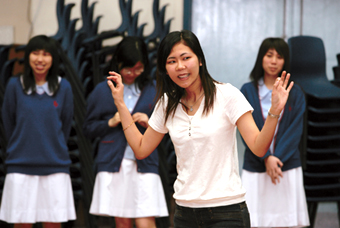 |
 |
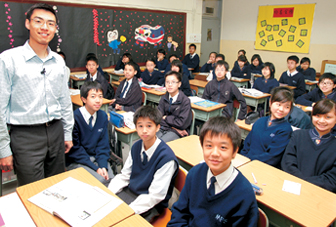 |
 |
 |
 |
 |
 |
 |
 |
In
recent years, the declining school-age student
population, teacher redundancies and school closures
have deterred many young people from considering
teaching as a prospective career.
|
 |
|
 |
 |
 |
 |
 |
 |
 |
 |
 |
 |
|
 |
 |
 |
 |
 |
 |
 |
Changes in funding
policies for higher education and the decline in the
school-age student population pose unprecedented challenges
for the Institute in the years to come. Development
is also affected by the external environment where the
attractiveness of teaching as a career is being challenged.
These factors are having far-reaching implications in
the successful implementation of education reforms.
Operating in a Stringent Resource
Environment
In the next three years, the Institute's funding from
the University Grants Committee (UGC) will fall from
$632 million in 2004-05 to $413 million in 2007-08,
representing a budget cut of 33%. This reduction in
funding is directly linked to the cut in student numbers
approved by the UGC. As a result of the 15% reduction
in funded student places in the 2005-08 triennium and
changes in the mix of academic disciplines for students,
the Institute has been compelled to
reduce its academic
staff strength. A |
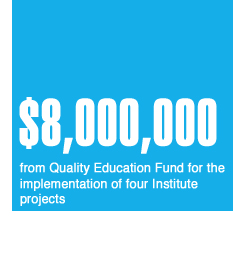 |
 |
 |
Voluntary
Departure Scheme, followed by a Compulsory Redundancy
Scheme, was therefore introduced in 2004-05, with the
entire exercise being completed by the end of the academic
year. This was due in large measure to the cooperation
and professionalism demonstrated by affected staff members.
The Institute has also been very careful in its selection
of new staff, making sure that they will have the necessary
expertise to ensure HKIEd's long-term development, in
line with its self-accrediting status.
|
 |
 |
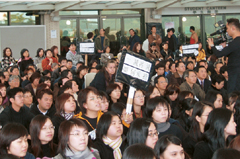 |
| HKIEd students
and staff members rally against the proposed 33%
budget cuts at the Tai Po Campus. |
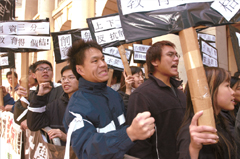 |
| Institute students
protest against the massive funding cuts outside
the Legislative Council Building. (picture from
Ming Pao) |
|
As part
of the HKIEd’s measures to reduce its dependency
on the UGC as its single source of funding, the Institute
successfully doubled its income from other sources during
the year. The Variation for the Improvement of Teaching
And Learning(VITAL) project and the Assessment Project,
which secured close to $63,000,000 from the Education
and Manpower Bureau (EMB) for their respective three-year
projects, are just two examples of successful funding
from non-UGC sources. The Institute has also developed
self-funded programmes to meet the needs of the education
sector. Examples include the Postgraduate Diploma Programme
in Chinese and English Studies and the Master of Education,
launched in 2004-05 and 2005-06 respectively.
Training
Professional Teachers
Who Will Implement Education Reforms
Aiming to ensure that Hong Kong becomes a knowledge-based
society, the "3-3-4" education reforms are
being implemented to develop Hong Kong’s young
people into critical thinkers and independent problem-solvers
with a broad knowledge base. Liberal Studies is therefore
being introduced as a core subject at secondary school
levels. The key to the success of these education reforms
however will hinge on whether Hong Kong has the dedicated
and professional teaching force to implement it.
Equipping Pre-service
Teachers
Under the "3-3-4" education reforms, secondary
students who previously would have continued to complete
Form 7 will spend a year less at school. At the same
time, tertiary students will spend an additional year
in university. For HKIEd, this means that the Institute
will need to strengthen both the general foundations
as well as the general knowledge of new entrants, making
sure that students, upon graduation, will be knowledgeable,
versatile, critical and creative teachers, who are more
than well-prepared to confidently and successfully implement
the education reforms.
|
 |
 |
 |
 |
 |
|
| |
|
 |
 |
|
 |